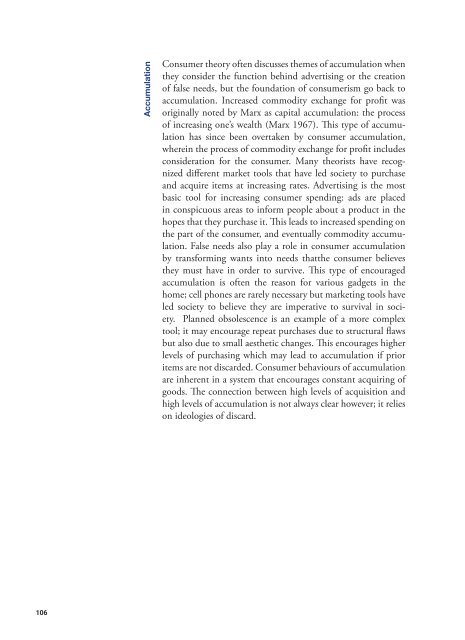Publication (142 pages).
Create successful ePaper yourself
Turn your PDF publications into a flip-book with our unique Google optimized e-Paper software.
Accumulation<br />
Consumer theory often discusses themes of accumulation when<br />
they consider the function behind advertising or the creation<br />
of false needs, but the foundation of consumerism go back to<br />
accumulation. Increased commodity exchange for profit was<br />
originally noted by Marx as capital accumulation: the process<br />
of increasing one’s wealth (Marx 1967). This type of accumulation<br />
has since been overtaken by consumer accumulation,<br />
wherein the process of commodity exchange for profit includes<br />
consideration for the consumer. Many theorists have recognized<br />
different market tools that have led society to purchase<br />
and acquire items at increasing rates. Advertising is the most<br />
basic tool for increasing consumer spending: ads are placed<br />
in conspicuous areas to inform people about a product in the<br />
hopes that they purchase it. This leads to increased spending on<br />
the part of the consumer, and eventually commodity accumulation.<br />
False needs also play a role in consumer accumulation<br />
by transforming wants into needs thatthe consumer believes<br />
they must have in order to survive. This type of encouraged<br />
accumulation is often the reason for various gadgets in the<br />
home; cell phones are rarely necessary but marketing tools have<br />
led society to believe they are imperative to survival in society.<br />
Planned obsolescence is an example of a more complex<br />
tool; it may encourage repeat purchases due to structural flaws<br />
but also due to small aesthetic changes. This encourages higher<br />
levels of purchasing which may lead to accumulation if prior<br />
items are not discarded. Consumer behaviours of accumulation<br />
are inherent in a system that encourages constant acquiring of<br />
goods. The connection between high levels of acquisition and<br />
high levels of accumulation is not always clear however; it relies<br />
on ideologies of discard.<br />
106


